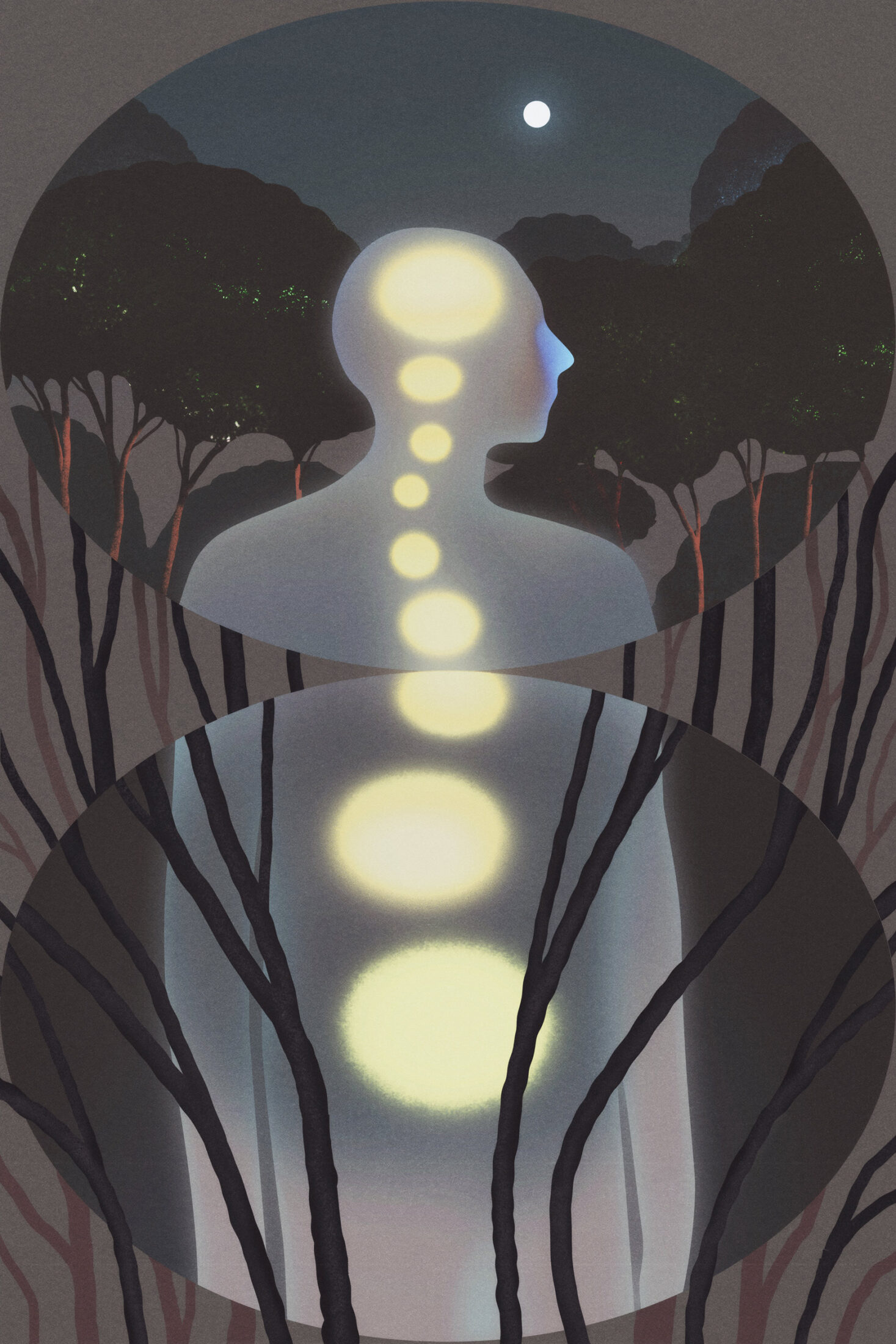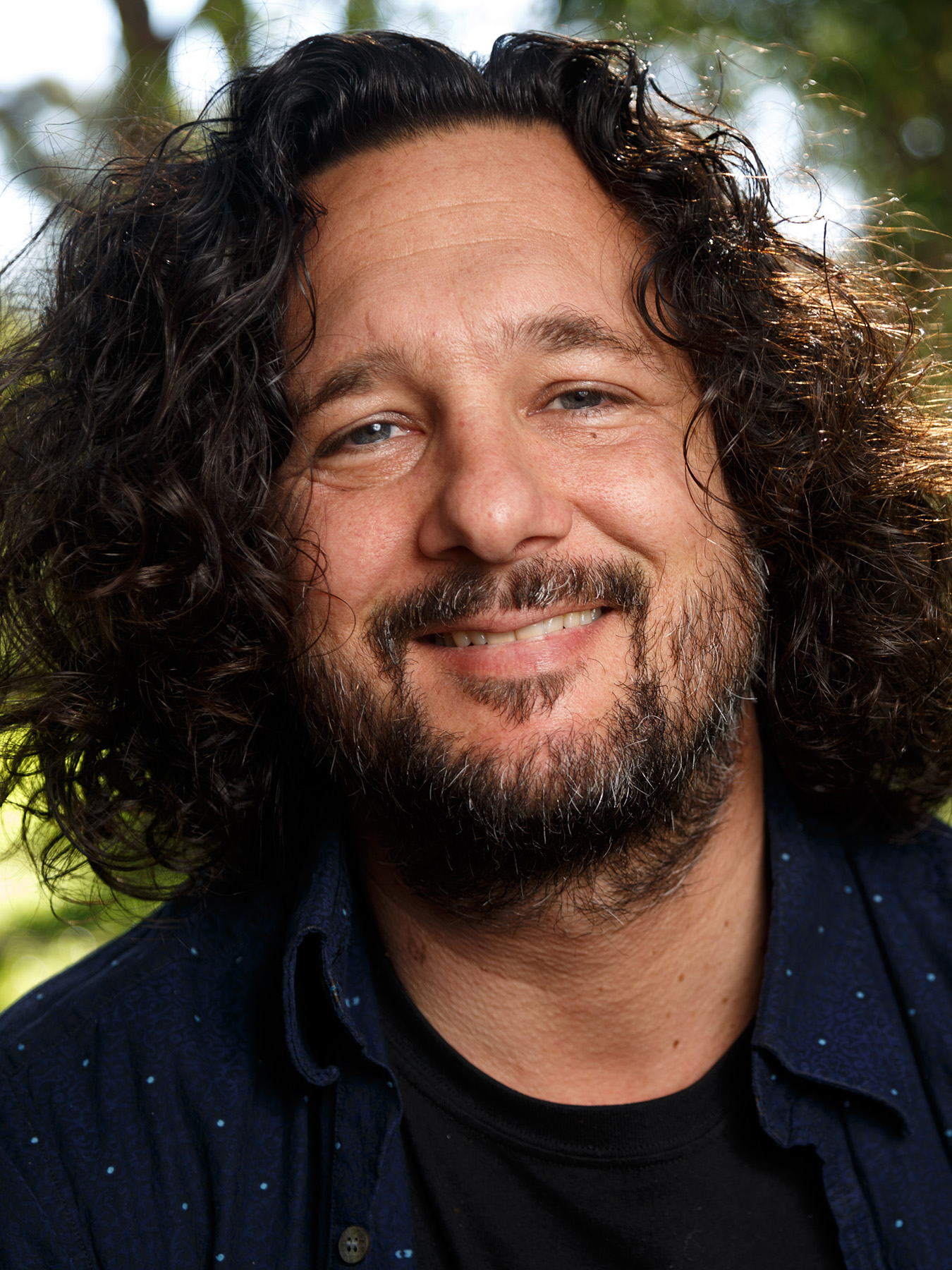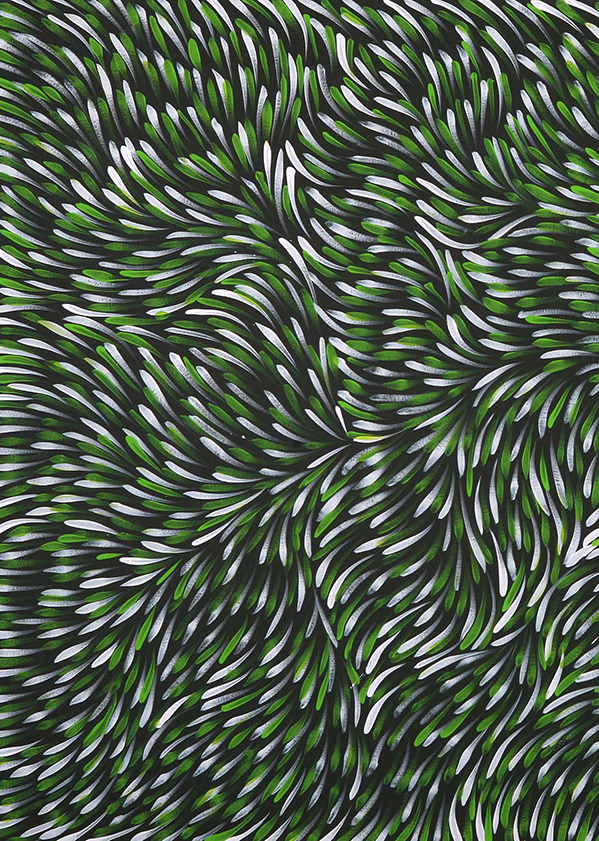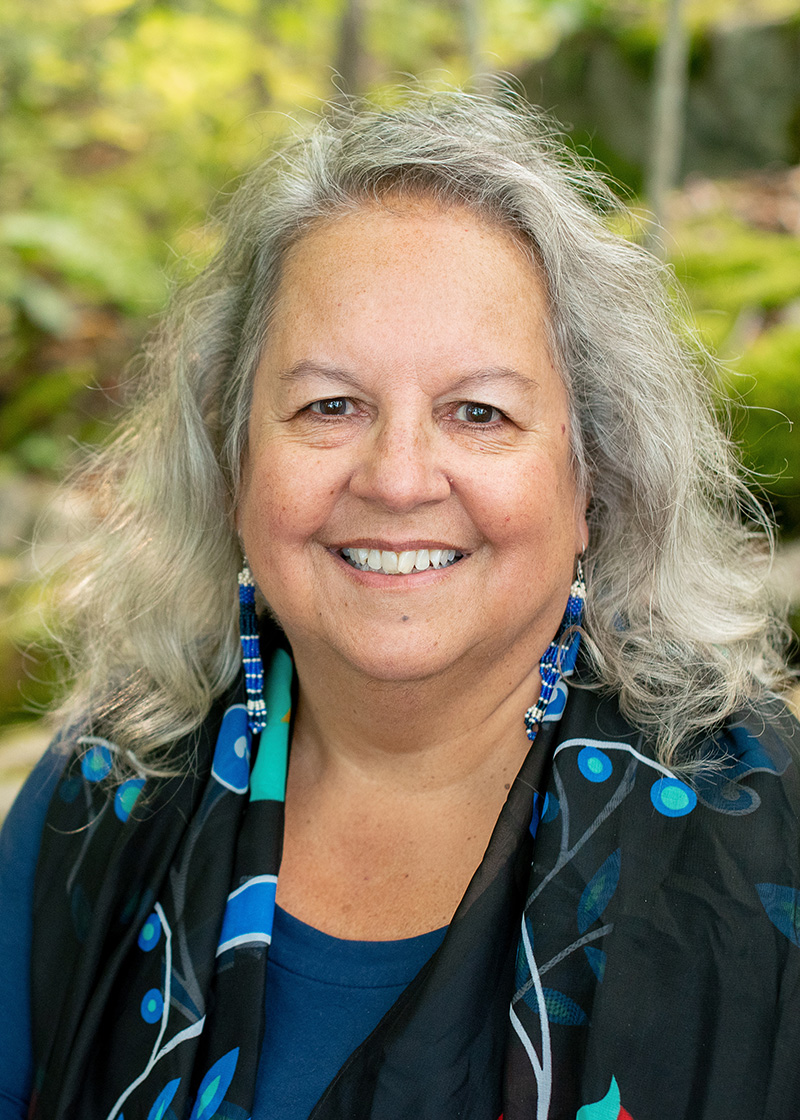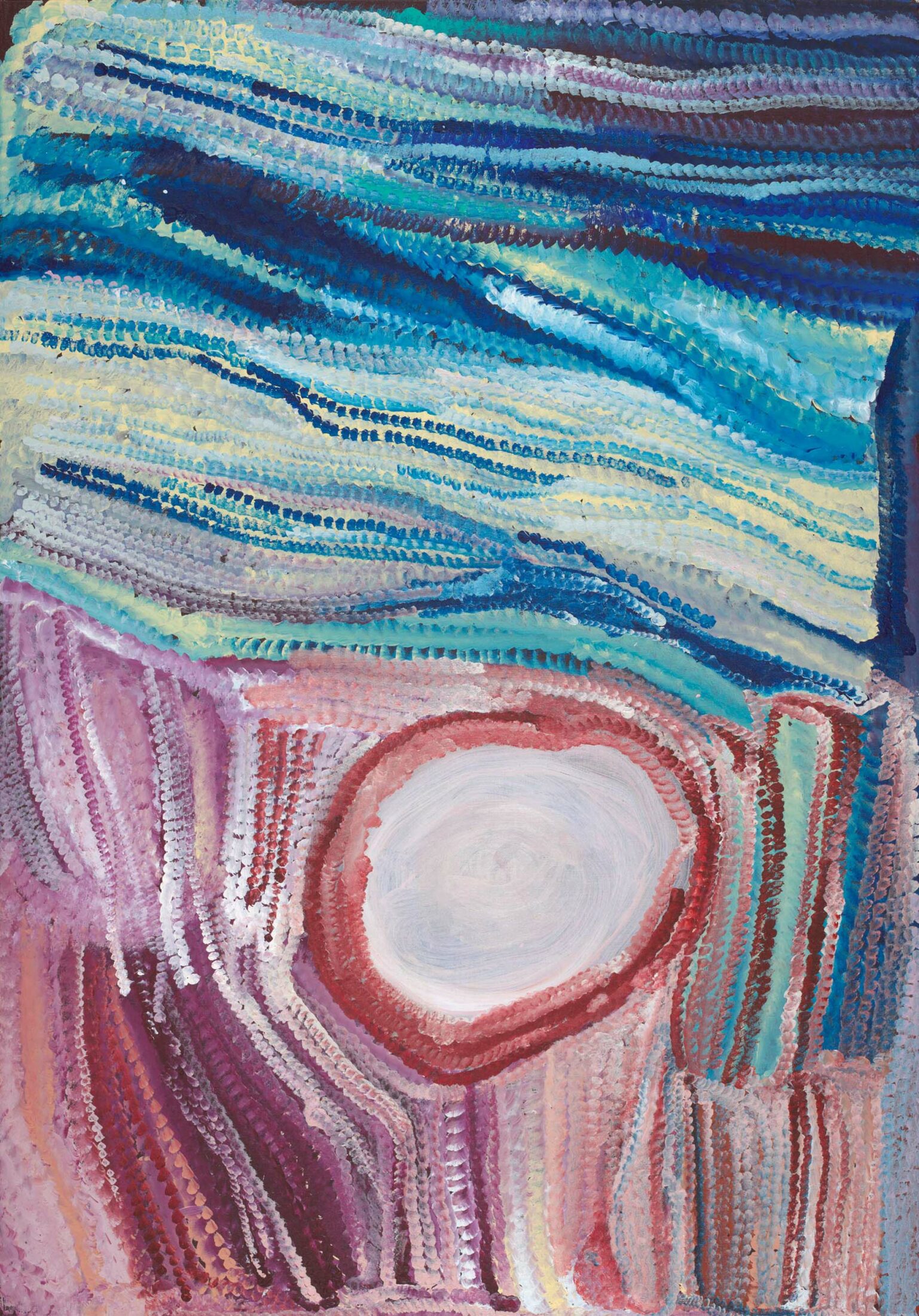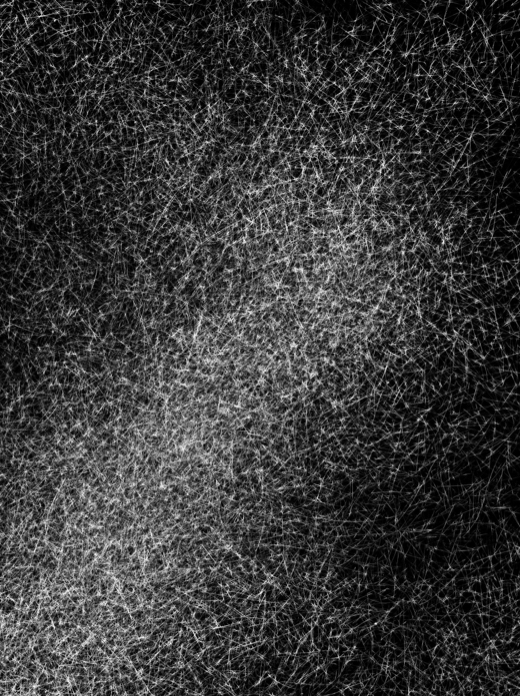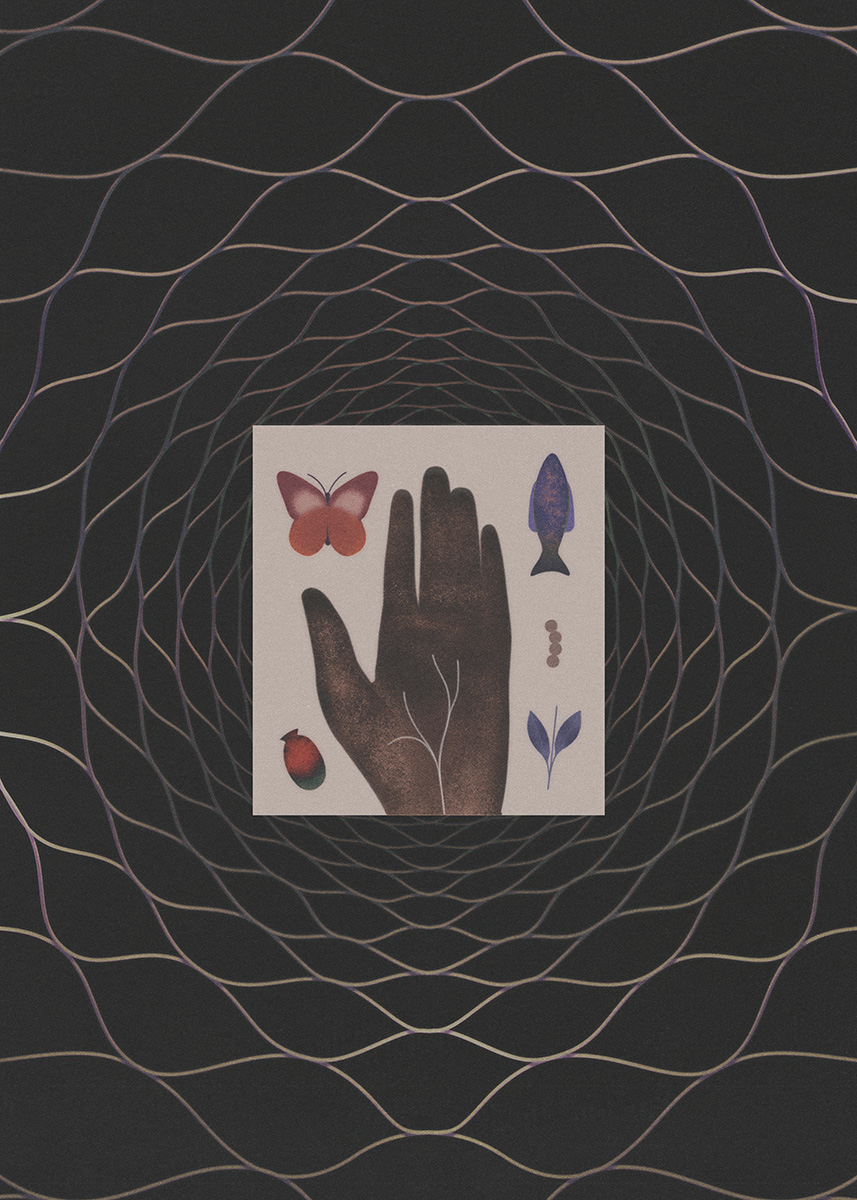
Tyson Yunkaporta is an Aboriginal scholar who belongs to the Apalech Clan in far north Queensland. He is the founder of the Indigenous Knowledge Systems Lab at Deakin University in Melbourne, the author of Sand Talk: How Indigenous Thinking Can Save the World and Right Story, Wrong Story: Adventures in Indigenous Thinking, and a carver of traditional tools and weapons. His work focuses on applying Indigenous methods of inquiry to address complex issues and global crises.
Ibrahim Rayintakath is an illustrator and art director based in India. His editorial illustrations have appeared in The New Yorker, The New York Times, Wired, NPR, and elsewhere. He lives and works in Ponnani, a small coastal town facing the Arabian Sea.
Probing the way we overthink and underfeel our existence, Aboriginal scholar Tyson Yunkaporta urges us to attend to a vital intelligence beyond the cerebral: the fire in our gut.
The potential of a gut-brain, fire-lightning connection is a constant process of inquiry for me, a hypothesis that is neither verifiable nor falsifiable but that still demands my intellectual engagement because of the peculiarities of my totemic relations on the continent currently known as Australia. My fatherside totems (Apalech clan, Western Cape York) relate to a monsoon season of storms, and my motherside totems relate to a cold season of abundance and bushfire. I take my fatherside ways, but no man works with fire on the land without respecting the authority of his motherside family, as with most things. Even in patrilineal cultures, matriarchy is still strong, and fire sticks work only if one is male and one is female. So motherside totems, such as sparrow hawk, are at the front of my mind when I tell stories
about fire.
Sparrow hawks spread bushfire by snatching burning sticks from our campfires and dropping them in the dry grass, blown flat by seasonal winds, to scare up small game. This is part of the pattern followed while caring for the land with fire-stick management practices performed by humans as a custodial species in the region. Fire is connective across domains in spirit and practice, through marriage and ritual. The regenerative friction between male and female energies and the dynamic places and people in which they overlap keep fire burning in the universe.
In my family, Brolga is a crane associated with a pantheon of animal and plant species, substances, and phenomena: blood, urine, Rainbow Serpent, feet, whirlwind, lightning. Brolga and lightning share the same totemic classification in our science, but fire and lightning are only indirectly related. Friction between the earth and sky creates a charge of connective power in lightning bolts that can ignite vegetation and turn sand to glass. Fire and lightning are only tangentially connected in this cosmology, an indirect relation moderated in my case by marriage across ritual complexes in the same way that the gut and brain are moderated by the strange functions of the cranial nerve complex.
The way I learned to set fires on Country was always through the regenerative disruption of everyday life processes that humans conduct when seeking sustenance and resources on the land. To find honey, an area might be burned to make walking easier in thickly grassed savanna at precisely the time that soil needs the ash and stimulating flame to begin its next regenerative cycle. Just as collecting fibers for string or fishing at a precise time of peak fat in a coastal bioregion may require the burning of grass to remove the annoyance of mosquitoes, the grass seeds there need to be activated by the fire’s heat and smoke. Symbioses have developed over deep time, with affordances built into the landscape as indirect communication between land and people that indicate what is needed by an ecosystem in which humans are still embedded within appropriate ecological niches.
Being separated from Country in the city for several years now, this communion is no longer apparent to me in relation to my habitat. The focus of my inquiry into the nebulous connection between earthly flame and celestial static has been driven inward. Land and kin relations no longer moderate my praxis of sparking and grounding cognition, which has become a hazy and stochastic process that is far too conscious to be effective. I am overthinking and underfeeling my existence, making inaccurate predictions from incomplete data sets with increasingly dire consequences. Being too much in my head has given me piles (hemorrhoids) and irritable bowel syndrome as my gut stagnates and atrophies in isolation from the rest of my existence.
Executive function is a powerful neural process that should never be deployed by individuals acting outside of community and the Law of the land. In Australia, we learned this the hard way millennia ago. Much of our Lore recalls stories of people transgressing in this way and their subsequent crimes, punishments, and learning. The adolescent cultures of modernity and postmodernity are beginning to relearn such lessons, long forgotten in industrialized lineages. The myriad sparks of individual sovereignty tend to incinerate a place and people after a few centuries, and the slow burn of collective self-determination is a regenerative pattern that keeps creation in motion indefinitely.
Frontal lobes are helpful when processing the cognitive dissonance that arises when sharing agency and resources with diverse beings existing in interdependent relation, but when they are deployed for audacious bootstrapping in an environment of hypercompetitive behavior, the results can be catastrophic. Individualistic thinking is never enough to sustain life. That’s why our custodial species has developed two brains—one for thought and one for thinking-feeling.
There is a “big power” in your gut that must be attended to vigorously, in connection with the bellies of all others with whom you are in relation. It not only burns your food to power every cell in your body; it exists independently of your central nervous system, unlike every other part of your body. The neural-like processes of this sacred system process dark data and incomplete data sets using not cognition but logics that resemble what we call emotion today. The separation of thought and feeling in recent centuries has had a dramatic impact on the functioning of the belly. Rigorous gut feeling is supposed to have veto power over your executive function. If ignored for long periods, it will seek ways to sabotage your murderous path of narcissism and bring you back into proper relation with the beings and lands that sustain you.
The human two-minded system of brain and belly mirrors the cosmological structure of existence on this planet. In the turnaround event of creation, sky-camp and earth-camp separated, forming a complimentary dyad—as above, so below. Earth and sky, powered by the fires of their interaction, form a sentient system. Stars move in patterns that signal activation of seasons and activity for every terrestrial agent, including sentient bioregions. There is Lore and knowledge up there, as there is down here. Terrestrial agency, like the operation of the gut, is more fluid than the dance of stars so that systems may be responsive in real time to the inevitable transitions and upheavals of creation.
This agility is possible only when every agent in an Earth-based system is operating independently while responding to interdependent relations. The horrendous complexity of this responsive ontology defies mechanical computation and so must be thought-felt through many sentient bellies networked together in distributed, autonomous collectives. The governance of this collective executive function must be grounded in the Lore (story) and Law (protocol) of the land. The Law is in the code, the essence of sacred entities that exist as potentialities in the earth and emerge during dramatic creation events. They are maintained in sacred sites by humans as custodial beings, and those sites produce flows of energy that keep creation in motion.
The flows from sacred places in the earth and sky foster negative entropy, offsetting the inevitable breakdown of complexity and loss of energy that occurs in all systems as a result of what many call the second law of thermodynamics. A more human way to express this concept might be “It’s easier to break shit than make shit.” All things expire over time under this law of physics, which is what gives rise to the concept of linear time in cosmologies of singular entities and closed systems, cosmologies that no longer care for the energetic flows of sacred sites that connect land and sky.
More cyclic models of time suggest that entropy is not bound by beginnings and endings in regenerative systems. Energetic feedback loops between the earth and sky and all the systems within these domains maintain the infinite nature of creation. The fixing of nitrogen in soil by lightning strikes is a measurable example of this process. The death and the waste of one system is always another system’s lunch, which is why shit is sacred in the Lore of the land. Your brain and gut relation mirrors those cosmological processes.
There is a “big power” in your gut that must be attended to vigorously, in connection with the bellies of all others with whom you are in relation.
The gut governs terrestrial relations and is in constant communication with land and all our human and nonhuman kin. The head follows slower signals and cannot pivot in ways that are informed by complexity, so the mind can manifest as a top-down governance relation when it is not used in concert with the gut. When a person’s head is in the clouds, carrying or longing for unearned power and privilege, their gut is out of right relation, which may result in a series of cascading failures that affect all the systems and beings around them. Executive function should always be signed off by the gut before any action is taken, if these consequences are to be avoided. Your gut might pick up the subtle informatics of a car salesman weirdly staring at your kids while you’re distracted and checking under the hood—so your head may be telling you it’s a good deal, but your gut is telling you not to trust this creep.
The metabolic flames of the gut can burn hot, cold, or just right depending on how the fire is tended in relation to constantly shifting contexts in land-based and social dynamics. It must be kept clear in order to function correctly. Unfortunately, this involves behaviors widely regarded as dysfunctional or pathological in contemporary contexts. Outbursts allowing full expression of rage, annoyance, fear, joy, and grief must be allowed to run their course in order to clear the big spirit that rests in the belly and maintain it in a constant state of flow, in which energy enters, swirls, gathers, and is dispelled in regenerative patterns of behavior.
I don’t do this anymore. I am at risk of ostracization and imprisonment if I yell “M———!” in the street or throw things around in my tiny new living space. (I can’t put that word in print here as it is highly inappropriate, but it’s the one that rhymes with brotherfucker.) As a self-managing neoliberal subject in a growth-based economic system, I am responsible for managing my behavior and a tidy workspace, minimizing conflict and violence, which includes trying not to use profanity in the content I produce for settler audiences.
I’m not very good at this job, a fact that renders my continued existence precarious. The subsistence of my family depends on my ongoing ability to engage in the production of text and audio that stimulates thought in ways that keep the wheels of capital turning. Without daily signals from land and sky, the machinery producing these narratives is contained only within my mind-body system, which I’m currently driving like I stole it to cover rent and living expenses.
Systems in isolation (like rogue predators, dying suns, settler campfires, and transphobic celebrities) can enjoy short periods of hot-burning illumination but ultimately collapse into ashes, cold, and darkness. Without the complex interconnection of a thousand regenerative loops, every engine breaks down after a brief, flaring L-curve of production. Artificial systems bent to singular goals (like empires, multilevel marketing schemes, celebrity sex tapes, and solar pool heaters) can never harness the economies of scale that are present in nature, the metabolic efficiencies of “energy return on energy invested” in balanced ecologies, where the aims are manifold and the outcomes distributed across and between systems.
I’m getting horribly fat. This is not an aesthetic judgment but a measure of my ability to continue working and keeping my family alive. Tying shoelaces makes me pant like a dog now, and I’m so exhausted most days that I’m experiencing sleep apnea while awake, as I regularly forget to breathe. Respiration has become a conscious process for me, but this is part of the cognitive load that comes with obesity. Fat is beautiful, sure, but it feels like shit. As an isolated organism, I am not harnessing the regenerative efficiencies of scale that occur in healthy habitats. I reflect the health of the systems I inhabit, producing less and less energy in relation to the fuel I burn, stockpiling toxic reserves until the wheels stop turning completely.
Usually, increasing the size of an organism will also increase the efficiency of its metabolism, raising its longevity and outputs. In the tinkered systems of modernity, these economies of scale are greatly reduced. At my waistline’s current rate of expansion, I can expect to double in size by next October, but the fire in my belly that powers my existence will not burn 25 percent brighter. Growth is good if it comes from pregnancy, but not so good if it comes from doughnuts.
I’m not suggesting that this is true for all people of girth—perhaps there are many who enjoy more interdependent relations with their environment and therefore achieve the same economies of scale present in balanced ecologies, such as Israel Kamakawiwo‘ole, that Hawaiian fella who played “Over the Rainbow” on the ukelele. He looked about fifty times healthier than Meatloaf, although respiratory failure did take him in the end. There are always limits to scale, as everybody from blue whales to Jeff Bezos knows.
A rat enjoys a longer life span than a mouse half its size because its metabolic fires burn at a rate of buy four, get one free, reducing its heart rate. Both lives have the same number of heartbeats, but the machine-gun pace of a mouse’s cardiology makes for a shorter lifespan. I can feel my heartbeat in my face like a death-metal baseline right now, and I know I’m the caged mouse rather than the free-range rat in this scenario.
The quality of fuel is almost as important as the efficiency of the mechanism. Every habitat offers the perfect kind of wood in perfect quantities for small campfires, wood that cannot be used until it has fallen from the tree or bush. If you are present in the right season to harvest the appropriate resources, the optimal fuel will be present. There are affordances in Country that tell you where to be and what to do, and cooking or keeping warm is always provided for in right relation with the land. Your fuel is dry, your fuel is dense, and it is always in a location convenient to your fire, if you have placed your camp in response to the needs of the land. The land must also eat and metabolize your waste—your food scraps, shells, bone, flesh, urine, and excrement. Of course, this should never occur in proximity to the source of your drinking water, which is why the firewood is always useless near a creek or pond.
In times of disruption or emergency, you may have to burn unseasoned or wet wood. There are ways to build that fire to minimize the amount of toxic smoke in the air and produce enough heat to dry and warm your children and cook their food. However, in our culture, this is supposed to be a rare occurrence in response to urgent need. You don’t burn green wood if you can avoid it.
We have a firepit in the small yard at the front of the unit we are renting. Recently, we bought a bag of wood from a service station and that wood was green. It was also the wrong wood for a fire in this place and season on Boonwurrung land. We built the fire carefully to dry out the sap that bubbled from the ends of each piece, but still there was dirty gray and black smoke in the air. The wood burned briefly and cracked into ugly charcoal pieces that immediately went cold. It would hold heat only if new wood was constantly burning on top of it, very much like the economic and social systems that have been imposed on this place. Our campfire, like so many contemporary economies, had a slow metabolism and voracious need to consume fuel and stockpile useless charcoal. It is out of place and out of time.
My thinking and my narratives are similarly complicated and resource-intensive these days. This is a result of writing rather than speaking. Literacy rewires the brain in catastrophic ways at the biological level, thickening the connective pathways between the logical and intuitive hemispheres of that organ and forcing some neural functions to migrate between one side and the other, squatting in territories where they don’t belong. Our facial recognition mechanism, for example, is paying rent in a hostile neighbourhood where it can barely function. These facts I can back up with scientific evidence, however I can only speculate on the impact that print has on my gut-brain connection and my ability to think-feel my way through this world.
If your story is wrong, your thinking is wrong. Disconnected relations with place and entities both human and nonhuman can result only in crazy thinking, from my cultural perspective. However, that is knowledge that defies measurement and can’t be taken on faith anymore. There is a lot of crazy thinking in the world, spreading faster than wildfires and devastating our living systems worse than superstorms. Crazy thinking is often presented as ancient wisdom, because the content is needed as more fuel for the fires of pseudointellectual consumption. Ayahuasca retreats. Paleo diets. Indigenous mindfulness workshops. Anti-vax elders on YouTube. Native corporate-coaching consultants. That auntie (and we’ve all got one) who likes to whisper into microphones, “There’s no justice—there’s just us.” The Ancient Wisdom Industry pays well, so grifters abound.
My spouse and I work toward a time 453 days from now, when we hope to have the resources and freedom to move to her Country in central Queensland so our children will grow up to know their heritage and the right way to live. We will be closer to my family’s Country there, a little farther to the north, so they will be able to understand their fatherside ways as well. I hold hope that they’ll be able to reconcile their brain and belly, north and south, lightning and fire, father and mother thinking. However, we struggle to find a location on her land that is not ravaged by mining, ruptured by the extraction of coal and gas to fuel the fires of industry and technology. My own family’s land is becoming similarly disrupted by bauxite extraction for production of aluminium, which will probably be used as an alternative for electric wire when the last of the world’s copper reserves are gone.
Energy infrastructure lasts only thirty years or so, and power lines must be replaced regularly no matter how many windmills and solar panels you install, a process requiring trillions of tons of metal. Either way, the motherside and fatherside lands of my children will both be consumed by the fire that produces power and the flimsy metal required to conduct it.
I have greater concerns about phosphorus, however, most of which has washed into the sea after fueling the “green revolution” that allowed the intensification of agriculture needed to keep pace with the exponential growth of industry, and the human labour that needed to be burnt to power it. There are no new reserves of phosphorus to be found now, and it is difficult to grow plants without it. It does you no good to have a clear, strong metabolic fire in the belly if there’s nothing left in the world to eat.
Still, many dream of a glorious future fueled by human sacrifice and ingenuity, an age of rockets and robot slaves driven by the flames of imagination and the power of positive thinking. I find it hard to share that dream, but that might be a result of my obesity-driven depression. As a human, I am hardwired to respond to my habitat and reflect its condition in my mind and body, and in that respect, I am a healthy example of my species. I should relax into my condition and stop overthinking. Too much lightning, not enough fire. Too much brain. Cognition is exhausting under these circumstances, so I outsource half of my neural function to a tinkered electrical system of automation to process my words, finish my story for me.
When I close this computation mechanism that I’ve outsourced my knowledge to, then reconnect with the green wood fire belching black smoke in my belly, I will see only a wrong story drifting up into a cloud that does not move or dissipate as clouds should. I wonder what will occur when those rains come, although I no longer have the capacity to predict such outcomes with any accuracy. If my gut were working, it might tell me to move to higher ground while I still can.
But there are embers in there still, if I sit quietly and rub my hands together then rest them just beneath my navel. My gut whispers, “How many Indigenous thinkers does it take to change a light bulb?” and I guffaw until it hurts. It’s hard to overthink things when you’ve just laughed your head off. That must be why they call it a belly laugh.
This essay is part of a series shared in partnership with Center for Humans and Nature, from their five-volume collection, Elementals.
